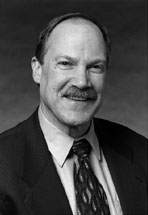 J. David Hawkins, Ph.D.
J. David Hawkins, Ph.D.
Dr. J. David Hawkins’ research focuses on understanding and prevention child and adolescent health and behavior problems. He seeks to identify risk and protective factors for health and behavior problems across multiple domains; to understand how these factors interact in the development or prevention of problem behaviors; and to test comprehensive prevention strategies which seek to reduce risk through the enhancement of strengths and protective factors in families, schools, peer groups and communities.
Since 1981 he has been conducting the Seattle Social Development Project, a longitudinal prevention study based on his theoretical work. Dr. Hawkins is the developer of the “Communities that Care” program, co-developer of the Social Development Model, a theory which provides a foundation for positive development and delinquency and drug abuse prevention, and co-author of “Preparing for the Drug (Free) Years,” and “Parents Who Care” prevention programs that empower parents to strengthen family bonding and reduce the risks for health and behavior problems in their families. He is also co-author of Communities That Care: Action for Drug Abuse Prevention, co-editor of A Sourcebook on Serious, Violent, & Chronic Juvenile Offenders, and editor of Delinquency and Crime: Current Theories.
He has served as a member of the National Institute on Drug Abuse’s Epidemiology, Prevention and Services Research Review Committee, and the Office for Substance Abuse Prevention’s National Advisory Committee. He currently serves on the National Institutes of Health’s Study Section for Community Prevention and Control, the National Education Goals Panel Resource Group on Safe and Drug Free Schools, and was a member of the Committee on Prevention of Mental Disorders of the Institute of Medicine at the National Academy of Sciences. He is listed in Who’s Who in Science and Engineering, was awarded the NPN Award of Excellence for Outstanding Contribution to the Field of Prevention, and was named the University of Washington Lecturer for the 1996-1997 academic year.
He is committed to translating research into effective practice and policy to improve adolescent health and development.
